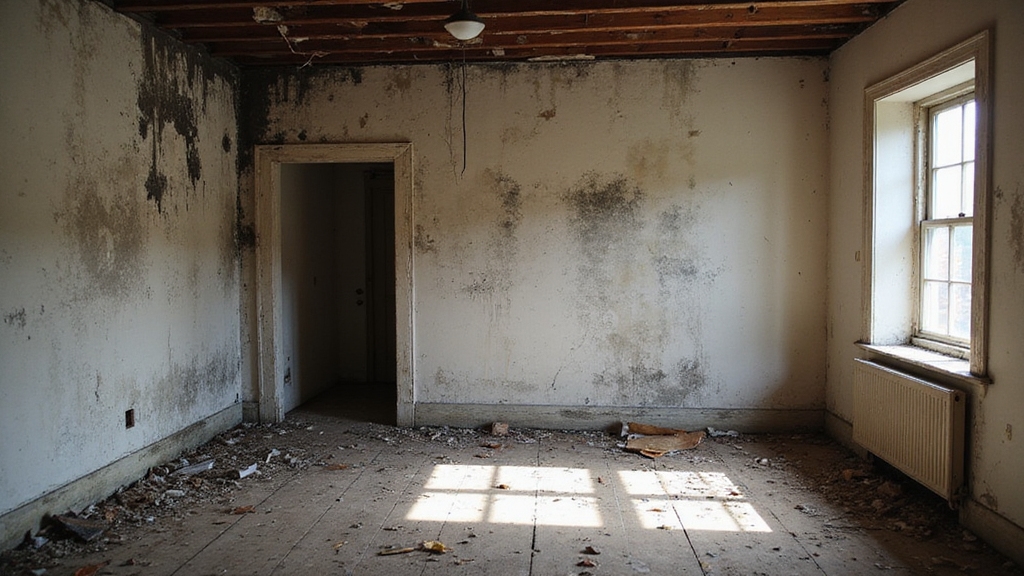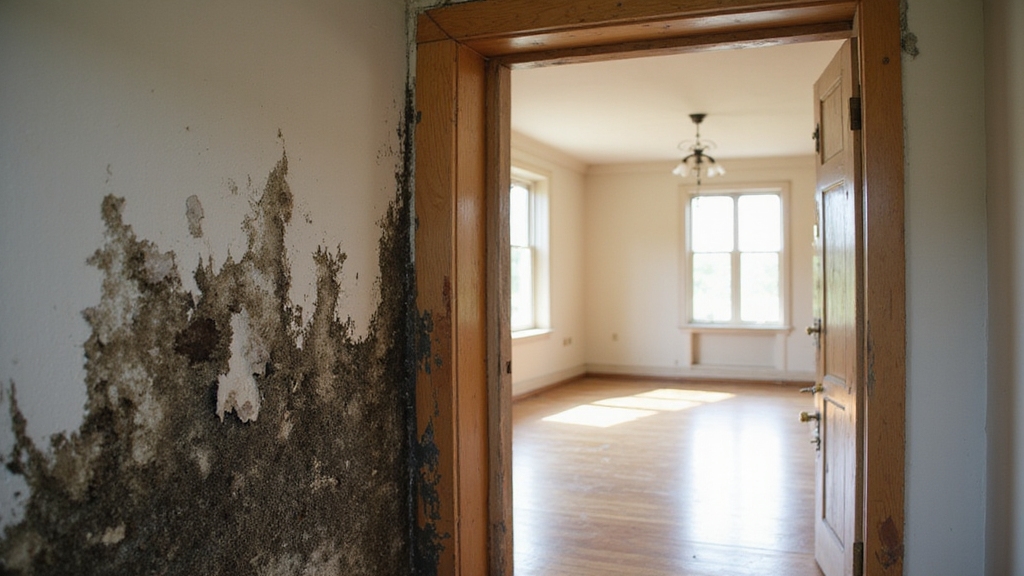Selling a house with mold or water damage is much harder than a regular sale. These problems scare off many buyers and can drop your home’s value. You must also follow strict rules for telling buyers about the damage.
These issues make selling stressful and risky. Buyers worry about hidden repair costs and health problems. Fewer people may want your home, so you could get lower offers or face long delays.
Selling a house with mold or water damage is more complicated and challenging than a traditional home sale. But you can handle these challenges with the right steps.
You need to know your options and the best way to move forward. This blog will show you how to sell your damaged house and avoid common mistakes.
Understanding the Impact of Mold and Water Damage on Home Value

Mold and water damage can lower your home’s value. Buyers usually see these issues as serious problems. They may offer less money or lose interest completely. Mold or water damage often scares off buyers, leading to lower offers or even lost interest in your home.
If your home has damage, appraisers might value it lower. This can reduce your power to negotiate a better price. Buyers may also subtract repair costs from their offers.
Insurance companies may not want to insure homes with unresolved damage. This can make it harder for buyers to get a mortgage. Some buyers might avoid your home for this reason.
Even after repairs, some people still worry about past water or mold issues. This can keep your home’s value down. If you plan to sell, you should find out repair costs and insurance options first. Neighborhood comps and location factors also influence how much your home is worth, even with damage.
Disclosure Requirements for Damaged Properties
Most states require you to disclose any damage, like mold or water issues, when selling your home. These rules help buyers know about problems before they buy. If you hide damage, you could face lawsuits or pay for repairs later. Being transparent about your property’s disrepair can also help you avoid legal issues and build trust with buyers.
Additionally, understanding co-ownership nuances can impact how you disclose and sell a jointly owned property. Sellers must give clear, written details about all known damage and any repairs. If you do not follow these rules, you risk legal trouble.
To avoid mistakes, contact a real estate agent or lawyer who knows local laws. If you are honest about your home’s condition, buyers will trust you more. This can make the selling process smoother, even if repairs are needed. Following the rules protects both you and the buyer.
Differences in Buyer Interest and Pool Size

Homes with mold or water damage usually get less buyer interest and attract fewer buyers overall. Most regular buyers avoid these homes because of health risks, safety issues, and repair costs. This lower demand can reduce your home’s value and change how buyers see your property.
If you list a damaged home, you may only attract investors, flippers, or cash buyers. These buyers look for bargains and will offer much less than market value. Legally, sellers must share any known issues, which limits offers to those willing to take risks.
First-time buyers almost never bid on homes with these problems. If you do get an offer, expect it to be well below your asking price. Here’s a quick comparison:
| Buyer Type | Interest Level | Typical Offer vs. Market Value |
|---|---|---|
| Traditional Buyer | Low | Below Market |
| Investor | Moderate | Significantly Below Market |
| Flipper | Moderate | Below Market |
| Cash Buyer | Moderate | Well Below Market |
| First-Time Buyer | Very Low | Rarely Bids |
Inspection and Appraisal Challenges
You’ll face heightened scrutiny during inspections when mold or water damage is present, as inspectors are required to note these issues in their reports. Appraisers typically lower the home’s value to reflect the cost and risk of remediation, which can directly affect your sale price and financing options. It’s essential to understand these legal and market realities before listing your property.
Additionally, conducting a title search can help identify any existing liens or disputes related to water or mold issues that may influence the sale process. Being aware of inspection challenges related to these damages can help you better prepare for negotiations and potential repairs.
Mold Impact on Inspection
Mold and water damage make home inspections more detailed. Inspectors must check for any health or structural risks. If these issues are found, it can affect the sale.
Inspectors will look closely at areas where water may collect. They will note any visible mold or water damage. Reports may also mention musty smells or signs of hidden mold.
If inspectors find mold, they may require cleanup before the sale can continue. Previous repairs will be checked to make sure they were done right. If not, more repairs may be needed.
Buyers and lenders rely on inspection reports for safety. Full disclosure is often required by law. If you are selling, be ready for strict review.
Appraisal Value Reduction
Inspection findings of mold or water damage usually lower your home’s appraised value. Appraisers notice visible damage, estimate repair costs, and think about future risks. If these problems are not fixed, your property may be worth much less than similar homes.
Lenders and buyers want to know the home is safe to live in. Sellers may have legal duties and liability if they do not fix the issues. Remediation can help recover value, but you must show proof of completed work.
If you find mold, you must disclose it, and the value may drop a lot. Water damage that is not fixed usually means a lower appraisal and possible legal trouble. If you finish repairs, you might get your value back if you can show proper documentation.
It is important to consider if the cost of fixing the problem is worth the higher appraisal. Your decision should also follow legal requirements for disclosure and safety. If you ignore these problems, you may face delays or a failed sale.
Negotiating Power and Buyer Expectations

When buyers know about mold or water damage, you’ll face stronger leverage from them during negotiations. Full disclosure often leads to lower offers or demands for repair credits, so be prepared to adjust your pricing strategy accordingly. It’s essential to understand your legal obligations and expect requests for concessions to avoid delays or potential disputes.
Additionally, cash buyers are more likely to purchase as-is, providing a smoother transaction without the need for costly repairs or extensive negotiations. Using a cash buyer can also help you speed up the selling process, especially if you need to sell quickly due to financial pressures.
Buyer Leverage in Offers
Buyers gain more power in negotiations when mold or water damage is present. These issues make a home less appealing and harder to sell. Buyers use this to ask for better prices or terms.
Homes with visible damage often stay on the market longer. This gives buyers more time and options to negotiate. They can use market data to justify lower offers.
If buyers see mold or water damage, they may ask for price cuts. They might also request credits or concessions at closing. Some buyers will want longer inspection periods to check for more problems.
Buyers could ask sellers to fix the damage before the sale. If sellers refuse, buyers might threaten to walk away. These tactics make offers less favorable for sellers.
Disclosure Impact on Price
Disclosure of mold or water damage usually lowers your home’s price. Buyers know about these problems and often offer less money. They expect to spend more on repairs, so they negotiate harder.
If the market has many available homes, buyers want bigger discounts. Your property may seem less appealing than homes without issues. This can make it harder to get your asking price.
Most states require sellers to share known damage. If you hide problems, buyers might cancel the deal or sue you. Being honest helps avoid legal trouble, but it usually means a lower sale price.
Repair Credits Negotiation
Disclosing mold or water damage usually leads buyers to ask for repair credits. Buyers rarely accept a property with these issues as-is. Most buyers use inspection reports to support their request for credits.
Buyers often request credits that match or exceed mold remediation costs. If water damage is present, buyers may ask for more credit to cover unexpected costs. Detailed repair estimates and damage reports are expected by buyers.
If sellers do not negotiate fairly, they could lose the sale. Sellers must be open and keep records of all agreements. Clear documentation helps prevent legal problems after the sale.
Repair Costs Versus Selling As-Is
Choosing between repairs or selling as-is depends on repair costs and possible selling challenges. If you fix mold or water damage first, the home will likely attract more buyers. Repairs can also help you get a higher price. Fixing mold or water damage can attract more buyers and may help you sell your home for a higher price.
Repairing issues before listing means you can market a move-in-ready home. However, mold and water damage repairs can be expensive. If you cannot pay for repairs, selling as-is may be a better option.
Selling as-is often attracts investors or cash buyers. You will probably get lower offers and must disclose all known problems. If you are unsure, consult a real estate expert and review the current market before deciding. Properly disclosing property issues is essential to avoid legal complications and ensure a smooth sale.
Financing and Loan Approval Obstacles
Even small amounts of mold or water damage can make loan approval difficult. Lenders often see these homes as risky and may reject the application. This can stop many buyers from getting the money they need. Additionally, the emotional investment homeowners feel toward their property can make it more challenging to accept the necessity of repairs or selling a damaged home. Lenders might ask for expensive repairs before giving final approval.
Appraisers could lower the value of the home if they see damage. Insurance companies may refuse to cover the house. Sellers must legally tell buyers about any known problems. These issues can scare away potential buyers. If you want to sell a damaged home, you should understand these financing challenges first. Recognizing home valuation concerns is crucial, as they directly impact the likelihood of securing financing and completing a sale.
Marketing Strategies for Damaged Homes
When marketing a home with mold or water damage, you should emphasize the property’s repair potential to attract buyers looking for value. Focus your efforts on investor buyers who are experienced in renovations and understand the upside.
Always disclose all known issues transparently to comply with legal requirements and build buyer trust. Highlighting the property’s repair potential can also appeal to cash buyers seeking distressed properties in Kansas City willing to undertake necessary renovations.
Highlighting Repair Potential
Repair potential can help make a property more appealing to certain buyers. If your home has mold or water damage, you can market it as a project. Some buyers are interested in fixing up homes for a profit.
Sellers should be clear about what needs repair. Providing contractor estimates helps buyers understand costs. Sharing these numbers builds trust with potential buyers.
If you have permits or repair plans, show them to buyers. Disclose all known problems to meet legal rules. This transparency can make buyers feel more comfortable buying a home that needs work.
If you highlight the home’s possible value after repairs, buyers may see a good opportunity. Use recent neighborhood sales to show this potential value. This approach attracts buyers who value improvement projects.
Targeting Investor Buyers
Targeting investor buyers means showing your property as a smart investment. Investors want clear numbers, quick deals, and low risk. If you highlight potential returns and make the buying process simple, you will attract more investor interest.
You should show any insurance claims that are already filed or approved. This helps investors feel safer about the deal. If you share honest repair estimates and contractor bids, investors can quickly check if the property fits their goals.
If an investor wants a fast sale, you can offer as-is terms. Always make sure your paperwork is in order and your title is clear. Use investor networks to reach more buyers if you want to grow your buyer pool.
If you follow these steps, investors can judge property value and risk more easily. They will feel more confident moving forward. Proper preparation leads to faster and smoother sales.
Disclosing Damage Transparently
You must share any known mold or water damage before listing your home. If you do not disclose this, you risk legal trouble and may lose buyers. Full honesty builds trust and helps prevent problems during the sale.
Buyers will check for hidden issues, so give them all the facts. Include clear photos and inspection reports that show the damage. If repairs were made, mention them to reassure buyers.
List the estimated repair costs to help buyers understand the investment. You should also provide all legal disclosures required by your state. If you are open about these issues, you attract serious buyers and protect yourself in negotiations.
Legal Liabilities and Risks
Homeowners who sell a house with mold or water damage face legal risks. If you do not tell buyers about these problems, you may get sued. Buyers can ask for money back if they find hidden damage.
Insurance companies might refuse to pay for mold or water damage claims if the issues were not disclosed. They may also delay payments if they suspect the damage was there before. Reviewing your state’s disclosure rules is important to avoid legal trouble.
Transparency helps you avoid lawsuits and protect your finances. If you are honest about problems, you lower your legal risks. Following the law is a simple way to keep the selling process smooth. Additionally, understanding the disclosure requirements can help you navigate the legal landscape more effectively.
Timeline to Closing: What Changes
When you sell a house with mold or water damage, expect longer inspection periods and possible negotiation delays as buyers assess risks and repairs. These factors can complicate your closing timeline, especially if lenders or insurers require remediation. However, investors often move faster, making offers with fewer contingencies but typically at lower prices.
Using targeted lead generation strategies, such as reviewing local public records or engaging with real estate clubs, can help connect with cash buyers who are prepared to purchase properties in need of repairs more efficiently. Additionally, understanding the market data and property condition can help sellers set realistic expectations and streamline negotiations.
Extended Inspection Periods
Selling a home with mold or water damage usually means a longer inspection period. Buyers need more time to check for hidden problems. This extra time helps everyone understand the risks and costs.
Buyers may hire experts to inspect for mold or water issues. They often bring contractors to estimate repair costs. Insurance agents might visit to see if the home can be covered.
If environmental risks are possible, buyers may order special tests. These inspections protect buyers and sellers from future legal or financial trouble. The sale process will likely take longer than a normal home sale.
Negotiation Delays Possible
Mold or water damage usually leads to delays in negotiations. Buyers often want repairs, lower prices, or extra protections before closing. These extra steps can slow down your sale.
If buyers request repairs or credits, this can add days or weeks to the process. State laws may also require you to share more documents about the damage. Each new request or document can make closing take longer.
Typical selling tactics like staging do not ease buyers’ concerns about hidden damage. Most negotiations will focus on inspection results and repair costs. If buyers worry about risks, they may take more time to decide.
Faster Investor Offers
Real estate investors make offers faster than traditional buyers. They focus on quick sales, especially for homes with mold or water damage. If you want to sell fast, investors can help you close quickly.
Investors usually skip long negotiations and repair requests. They often use their own quick inspection instead of a traditional home inspection. Offers may come within a few days.
Legal disclosures about mold or water damage are still needed. These requirements do not usually delay the process. Closings can happen in one to two weeks, saving you time and money.
Working With Real Estate Agents Experienced in Damage Sales
Working with a real estate agent experienced in damage sales helps you sell a property with mold or water damage. These agents know how to follow disclosure laws and protect you from legal issues. If you want a smooth sale, hiring such an agent is a smart choice.
They also understand the importance of accurately assessing and pricing homes in termite-infested conditions to avoid surprises during closing. The agent tailors marketing to attract buyers interested in fixer-uppers. They highlight your home’s good features and clearly explain any damage.
If you need to price your home, they use local sales and repair costs to guide you. Experienced agents can make the selling process easier and less risky. Their skills can help you get a better price and avoid problems. If you want to sell quickly and safely, consider working with one.
Cash Buyers and Investor Interest
Cash buyers and real estate investors often look for homes with mold or water damage. They want these properties because they can renovate and resell them for profit. If you are selling a damaged home, you may notice these buyers act fast.
Cash buyers usually make direct offers that are below market value. These offers account for repair costs and the risks involved. They can close quickly because they do not rely on bank loans.
Most investors include fewer conditions in their offers, but sellers must disclose all known issues. Full disclosure helps you avoid legal problems later. Negotiations with investors focus on price and repairs, not emotions.
If you need to sell quickly, working with investors may be a good option. You may not get full market value, but you gain a fast sale and relief from repairs. If speed and certainty are important, selling to a cash buyer can be helpful.
Staging and Presenting a Damaged Home
Staging and presenting a damaged home can help it sell faster, even if there is mold or water damage. Clean up clutter and use bright lighting to make each room look better. Neutral decorations can help buyers picture the home’s value after repairs.
Sellers must legally share any known problems with the property. Good presentation still shapes how buyers feel about the home. If the home looks well-cared-for, buyers may offer more, even if it needs work.
Virtual tours can help buyers see the property’s true condition. These tours also reach more buyers, including investors. If you use staging and virtual tours, your home may stand out from others on the market.
Weighing the Pros and Cons of Remediation Before Listing
Fixing mold or water damage before selling can make your home more attractive to buyers. This choice has both benefits and drawbacks. If you consider remediation, weigh the costs and legal risks first.
Repair costs can be high, and you might not get all your money back. Skipping repairs means you must tell buyers about any problems. Some markets may forgive small issues, but others may lower your sale price.
Home improvements can delay your listing and may miss the best time to sell. If you need to sell quickly, this could be a problem. Review these points carefully before making a decision.
Conclusion
If you are selling a house with mold or water damage, the process is more complex than a traditional sale. You must follow legal disclosure rules and decide whether to make repairs or sell the home as-is. If you do not handle these steps correctly, you could face delays or lose potential buyers.
If you want to avoid these challenges, you might consider selling to a cash buyer. We buy houses for cash in any condition, including those with mold or water damage. This option can help you save time and avoid costly repairs.
If you are ready to sell your home quickly and easily, contact Limitless Homes of KC today. We are here to help you through every step. Let us provide a fair cash offer and simplify your home sale.

